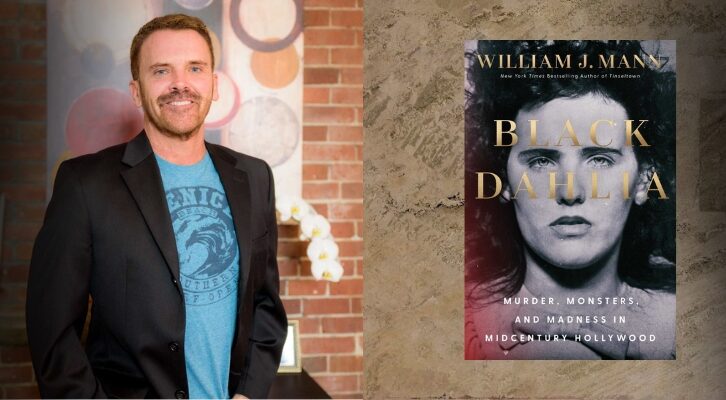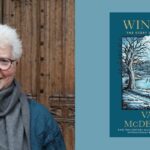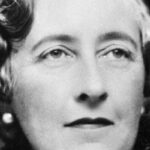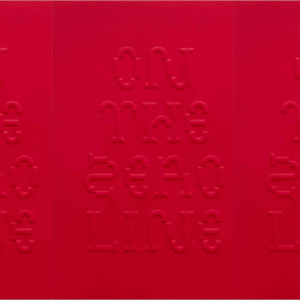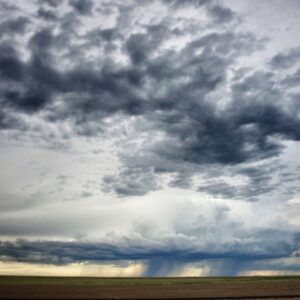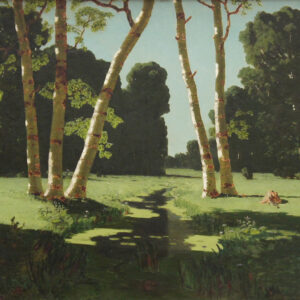
On the Invisibility of Middle-Aged Women
Dorthe Nors Writes Characters on the Verge of Disappearance
A year ago at a literary festival in Wales, I met a woman. It was at a reception at a castle that had a beautiful park and a regal view of the Welsh landscape. I had no companion to the reception, knew nobody there, and was circling with a glass of champagne trying to make it look as if I was waiting for someone who had just briefly stepped out of the picture. Then suddenly a woman appeared in front of me. Hello, she said. Isn’t it a breathtaking view? I nodded, and we shook hands and introduced ourselves. She was British, I was Danish. She pointed at a small man with a cell phone behind some shrubbery in the park: My husband, she said, and who are you with?
I told her that I was with nobody. I also told her that it was a bit strange to be with nobody amid scenery that so much called for somebody. But I’m a writer, I said, I’m used to traveling on my own. She looked at me as if I was mirroring something, and I was: We were both two middle-aged women at a reception without men (not counting the husband in the shrubbery) and it called for some narrative.
The woman explained to me that she had been a very successful lawyer. For over twenty years her career had escalated, she had become a star attorney, and there was not a week where she didn’t have to meet with the people in 10 Downing Street. She was someone, and therefore had to work around the clock and it was great fun, it was super interesting, it was high profile, and it was very exhausting. When she reached her mid-forties her husband (Mr. Shrubbery) had suggested that she slow down. It was too late to have children but never too late to rediscover themselves as a couple, and to be frank she was exhausted from all the Prime Ministerial counseling. So she let go of her job and found herself a lower profile one. No more cab rides to the center of power, just a briefcase, her 46th birthday coming up, and then the husband who would chew his toast very slowly in the morning. Perhaps he always chewed his toast that slowly, it’s possible, she just hadn’t been around to notice it, but there it was: slow chewing, and she had all the time in the world to witness it.
The worst thing, however, the woman told me and leaned in, was that this career change collided with my disappearance as a woman. You could say that I was no longer somebody, but I was also becoming a person with no body.
I nodded. There was something recognizable in this picture. I said:
So the cars don’t stop for you when you want to cross the street anymore?
She shook her head. I said:
You ask a younger man for directions at the railway station and he ignores you?
She nodded. I said:
You have an interesting conversation with a couple of men and a younger woman enters your circle, and the conversation is suddenly over?
She nodded and I finally threw the ace on the table:
Men you know are leaving their middle-aged wives to date women who are in their twenties and early thirties?
She raised her glass of champagne.
I could have told this woman that I write stories about women like her, but at that point her husband was done with the shrubbery and decided to join his wife again: End of conversation.
But I do write books about middle-aged, childless women on the brink of disappearing—or you could say—on the brink of losing their license to live. If a woman has kids, she will always be a mother, but a woman who has chosen not to procreate and who now no longer is young and sexy is perceived by many as a pointless being.
In my book So Much for That Winter I introduce two middle-aged women struggling with visibility. In the first novella, Minna Needs Rehearsal Space, we meet Minna, a composer in her forties. Yet another superficial lover has left her and with him he took a potential rehearsal space that Minna just might feel more passion for than the man himself. Minna is sick and tired of “toning it down.” She’s losing her voice, her essence, her vitality, from doing so. She therefore decides to get rid of the people who are restraining her and instead go find a rehearsal space, i.e., a room in which she can experiment, elaborate, grow without being controlled by the needs and expectations of others. In the second novella, Days, we meet a woman who is trying to heal a broken heart while figuring out what is truly important to her. Is it a man? Is it motherhood? Or is it creation itself and not necessarily through the womb but through being as such? While spring is blossoming around her she writes lists that like nature itself spill over and turn into something new and fruitful. This middle-aged woman can’t restrain herself either. On the brink of becoming invisible she insists on being visible.
The interesting thing is that middle-aged women on the search for essence and their license to live can come off as quite provocative characters. Some people regard them as lacking self control—or even worse; they are conceived of as “self absorbed.” A middle-aged woman who’s not preoccupied with handling herself or taking care of someone else is a dangerous, erratic being. What is she up to? And what’s the point of her being up to anything? She has no children, she has no family, the only thing she has is her own life and what good will that do anyone when she’s no longer a star attorney at 10 Downing Street, or when she doesn’t have a rehearsal space where she can compose her music, or when she’s in the process of turning into spring itself: Overflowing, no longer firm and contained, but escalating, growing wild.
When I was a little girl, my parents took me to visit my great aunt Barbara. She was an old woman who lived in a little red brick house in a small village in Western Jutland. I was told two strange things about this woman:
1) She never married and had no children.
2) She had been running the biggest farm in the parish.
On the walls of her house were pictures of the extended family and also of my aunt herself: tall, strong, rustic. If she had been Spanish there’s no doubt she would have been a flamenco dancer: Duende! Oh, yes, she had soul. I remember sitting on the stairs in front of her little house. There were blossoms everywhere and I was puzzled by the fact that this woman—unlike my artistically talented mother—had lived a life without husband and children. It felt as if I was being given an important lesson: A woman can be in the world on her own and it doesn’t necessarily make her invisible. It just might add a different kind of visibility to her. The aunt was in need of nothing, and because nobody was claiming her attention all the time (which I had already noticed was to be my creative mother’s destiny), she had time to just be in the world. My favorite story of my great aunt Barbara is that she went to America to visit her older sister who had emigrated in the early 1930s. Aunt Barbara was 75 years old when she got on a plane for the first time in her life. Never asked herself whether or not she could do it. Never asked anyone if she could or should do it. She just did it.
In a world where women are almost always defined by their relationships (daughter, sister, lover, wife, mother, grandmother) it strikes me as important to shed a light on the woman herself. What is she without all these shoes she has to fill? Well, she’s an existence and she’s an existence that either disturbs her surroundings—or is in the danger of retreating from them: like mist.
I was recently on a Danish radio show. The radio journalist had asked me all the usual questions, and I had given her all my usual answers, and here’s the strange thing: I never get asked why I find it important to portray human beings who are on the threshold of losing themselves—or gaining insight into their true natures. I often get asked why I write about women who look like myself, which is a puzzle to me. There’s not a journalist in the world who knows me well enough to know who I resemble, but anyway; there we were in the radio studio. The mic was turned of, and then out of the blue the journalist told me that she was turning forty soon. She also sighed and said: I’m so glad that you write about middle-aged women without children. I asked her why, and she said: Because there are so many of us, and because it quite often feels as if we’re not really here.
I wish she hadn’t turned the microphone off! That would have been a strong statement to air, and something to grab hold of for the many women who are no longer young, no longer the sexy one, no longer worth helping out in the subway, no longer worth stopping your car for when she stands there with her grocery bags and her saggy breasts, no longer worth the intellectual conversation, no longer on screen, no longer in the movies, no longer counted, no longer… somebody—or as I asked an older Swedish feminist once: What would you say is the strangest thing about becoming an older woman? And she answered: Woman?! I’m no longer a woman, and then she laughed her heart out, because what else can you do when the only alternative to becoming an older woman is dying young or—as many women choose in their fight to stay visible—subject themselves to Botox, knives and scissors, pain, and ridicule.
The two women in So Much for That Winter are women on the brink of invisibility. They are captured from within while they’re struggling to grab hold of the most important and beautiful thing a human being can possess: Duende! Soul! Presence! And when I wrote about them I felt that presence myself.
The importance of having a voice, being in the world, even though nobody needs you to be there, is especially stressed by the woman in Days (translated from the Danish by Misha Hoekstra), and I’ll let her have the last word. She deserves it:
8. Perhaps I spend too much time in cemeteries, I thought,
9. and lay down on the floor, vanished corporeally, and if I don’t exist, everything up to this point doesn’t exist either, my history, America, the stone I walk around with in my pocket, and then what he wrote last winter,
10. and if none of those things exist, sorrow doesn’t exist, and then tomorrow doesn’t exist either,
11. I thought, unable to breathe, for that which doesn’t exist cannot breathe,
12. for there aren’t many advantages to being that which doesn’t exist, except for being able to walk through walls and listen at doors,
13. and I’d heard it all now, so what is that?
14. Got to my feet,
15. placed myself over by the window,
16. listened to one of the neighborhood dogs and stayed with it through thick and thin,
17. thought, Why doesn’t anyone let it in? and could feel I was no longer a young woman
18. just a woman who has lived longer than my neighbor and the dog down there and many of the dead, and a thousand years ago I would have long since been laid in my grave, I thought, but look at me now,
19. mournful, alive, and kicking.
20. and I’d like to be able to believe in tomorrow,
21. and I can’t do anything but;
22. I’m hopelessly up the creek in the situation.
Feature photo: still from Another Year, dir. Mike Leigh (2010).
Dorthe Nors
Dorthe Nors received the 2014 Per Olov Enquist Literary Prize for Karate Chop, which Publishers Weekly named one of the best books of 2014. Her work has appeared in the New Yorker and A Public Space.











